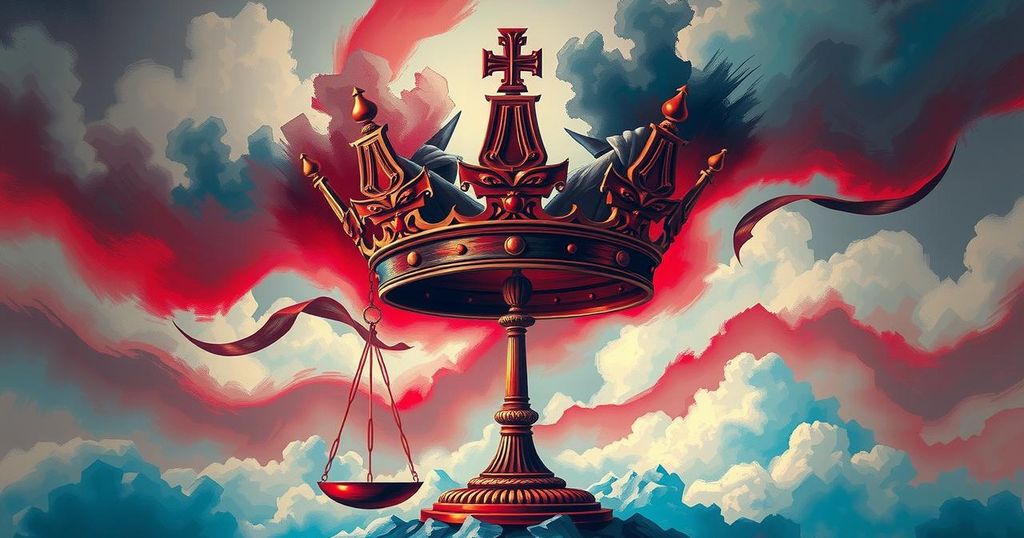Political Turmoil: The Fallout from Rodrigo Duterte’s Arrest in the Philippines

Former President Rodrigo Duterte’s recent arrest by the ICC has significantly altered the political landscape in the Philippines, showcasing the rivalry between the Duterte and Marcos political dynasties. Once allies, they now face serious accusations and impeachment proceedings that could reshape future political affiliations and power dynamics. The consequences of these developments are critical as they unfold ahead of upcoming elections in the country.
The swift arrest of former Philippine President Rodrigo Duterte upon his return from Hong Kong highlights the intensity of the political landscape in the Philippines. The International Criminal Court (ICC) issued a warrant for his arrest, resulting in a rapid transfer to the Netherlands, suggesting considerable behind-the-scenes planning. The official statement from Duterte’s spokesperson, asserting preparedness for any situation, did little to obscure the political maneuvering involved.
The relationship between Duterte and the Marcos dynasty was once a powerful alliance, with support shared during the 2016 election and the interment of Ferdinand Marcos Sr. at the Heroes’ Cemetery. However, following allegations of malfeasance against Vice President Sara Duterte, the partnership has deteriorated, creating an atmosphere of distrust within their political operations. Sara Duterte has faced serious accusations involving misuse of funds, which has raised eyebrows within the political community.
The culmination of tensions occurred with allegations claiming that President Marcos failed to safeguard Duterte from legal repercussions concerning extrajudicial killings during his administration. This issue, particularly disturbing given the estimated death toll of around 20,000, has strained their former collaboration. The House of Representatives took an unprecedented step by impeaching Sara Duterte, sending articles of impeachment to the Senate, an outcome that remains uncertain as to its final impact.
The impeachment proceedings have sparked nationwide discussions, especially with Sara Duterte’s approval rating plummeting. Although she maintains a base of support, opposition sentiment has emerged, with a significant portion of Filipinos backing her impeachment. This developing situation significantly underscores the power struggles at play ahead of crucial mid-term elections, where the fate of key political figures remains tenuous.
Former President Duterte’s controversial remarks regarding the possibility of harming senatorial candidates reveal the rising tensions and stakes involved for both the Dutertes and the Marcoses. President Marcos, facing constitutional limits on his future candidacy, must navigate these treacherous political waters while simultaneously managing his family’s legacy and influence. As Duterte approaches legal proceedings, the interplay of political dynasties remains a poignant backdrop against which these events unfold, marking a critical juncture for both families.
Ultimately, the arrest of Rodrigo Duterte underscores an escalating dynastic conflict in the Philippines. The fallout ripples across political affiliations, testifying to the complex intertwining of loyalty and power within the nation. As the ICC case progresses and elections loom, the repercussions of this turmoil are bound to alter the political trajectory in significant ways.
The swift arrest of former President Rodrigo Duterte by the ICC represents a pivotal shift in Philippine politics, exposing deep-seated rivalries between political dynasties. As impeachment proceedings against Sara Duterte unfold, the evolving dynamics may reshape alliances and influence future electoral outcomes. The relationship between the Dutertes and the Marcoses, once robust, has become fraught with tension, underscoring the fragility of political power in a landscape marked by historical legacies and changing fortunes. These developments warrant close observation as they signify a critical moment in the ongoing political discourse in the Philippines.
Original Source: www.benarnews.org







